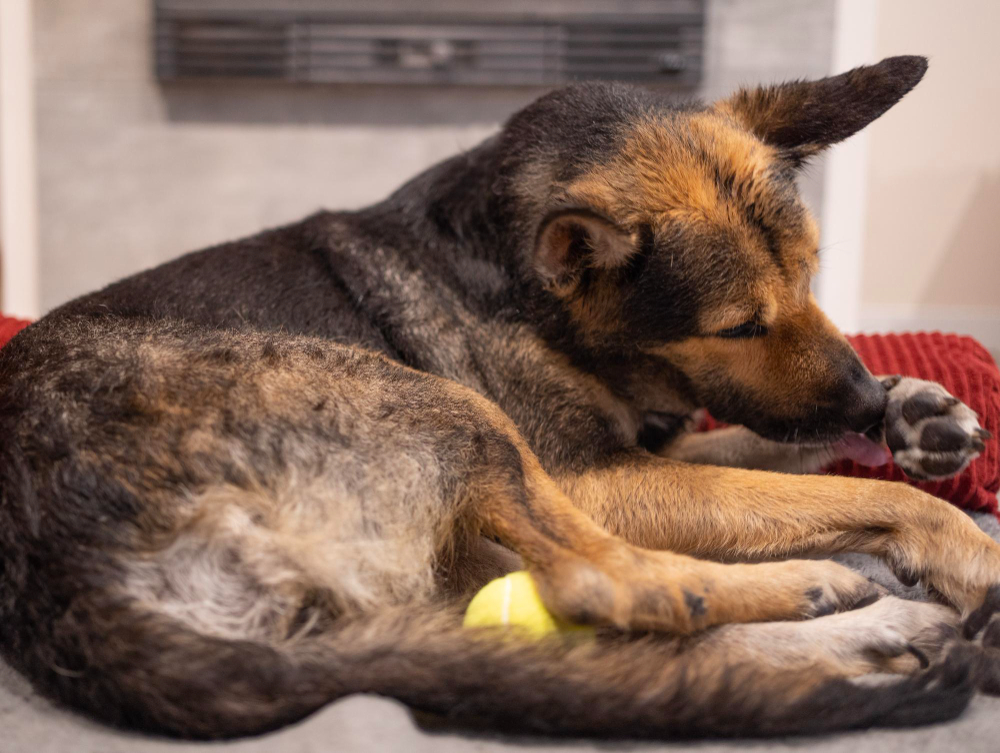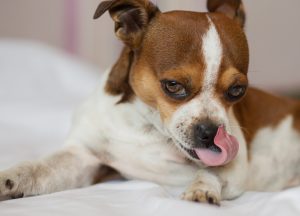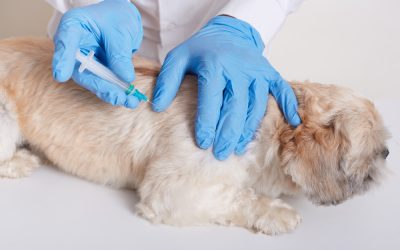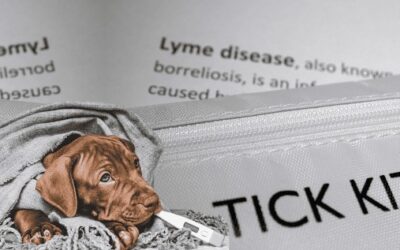Why Is My Dog Licking His Paws? Causes & Treatment

Dogs can have some curious behaviors, and paw licking is one of them. This habit can be due to many factors, from physical discomfort to emotional stress. Figuring out why your dog is doing it is key to helping them feel better and ensuring they’re happy and healthy.
In this article, we’ll dive into the most common reasons dogs lick their paws, explore possible treatments, and give you practical tips to better understand and support your furry friend.
Common Reasons Why Dogs Lick and Chew Their Paws
Allergies and Skin Irritations
A top reason for paw licking is allergies or skin irritations. Just like humans, dogs can be allergic to environmental factors like pollen, dust mites, or even ingredients in their food. These allergies can make your dog’s skin itchy and uncomfortable, leading them to lick or chew their paws to soothe the irritation.
Injuries or Foreign Objects
Dogs love to explore; sometimes, that curiosity leads them to step on sharp objects or get small injuries. Even a tiny splinter or a minor cut can cause discomfort, prompting them to lick their paws to ease the pain. Foreign objects like dirt or plant debris can also get lodged between their toes, leading to irritation.
Bacterial or Fungal Infections
Bacterial or fungal infections can cause redness, inflammation, and itching, making it hard for your dog to resist licking. Yeast infections, bacterial dermatitis, or even conditions like ringworm can be common culprits behind this behavior.
Anxiety or Stress
Just like humans, dogs can get stressed or anxious, which sometimes shows up as paw licking. Whether it’s separation anxiety or changes in routine, this behavior can be a way for your dog to cope and calm themselves down.
Boredom or Attention-Seeking
If your dog isn’t getting enough mental and physical stimulation, they might lick their paws out of boredom or to grab your attention. This behavior might be how they keep busy when they’re not entertained enough.
Compulsive Behavior
In some cases, excessive paw licking turns into a compulsive habit, similar to obsessive-compulsive disorder in people. This can be driven by genetics, underlying health conditions, or learned behavior and may require professional help.

How to Help Your Dog Stop Licking Their Paws
As Dr. Joshua Montgomery says: “Here are some common treatment options:
- Treating Inflammation or Infections: If the dog’s paw chewing is due to inflammation or infections, the vet may prescribe antibiotics to fight off infections. For allergies, they might suggest avoiding allergens and using medications like antihistamines. Proper wound care and itch relief are essential.
- Managing Pain: If the dog is chewing their paws because of pain or injury, the vet may recommend pain medications like nonsteroidal anti-inflammatory drugs or joint supplements for arthritis. Surgery might be necessary in some cases.
- Grooming and Nail Care: If grooming issues like torn nails or mats are the problem, the vet will address the specific issue by trimming nails properly and removing mats. Good paw hygiene is essential.
- Behavior Modification and Anxiety Management: If anxiety or behavioral problems are causing the chewing, the vet might suggest behavior modification techniques, training, and providing mental and physical stimulation. They may also prescribe anti-anxiety medications or natural supplements.”
How Can Pet Insurance Help You if Your Dog Needs a Treatment?
Pet insurance can be a valuable tool in managing the costs of treating a dog’s veterinary expenses. By having a pet insurance policy in place, you can have peace of mind knowing that you can provide medical care for your furry companion without worrying about the financial burden. Pet insurance can help cover the costs of veterinary consultations, diagnostic tests, medications, and even specialized treatments if required.
Reimbursement
This method is the most common for pet insurance companies. You pay out of pocket for the veterinarian bill, and then the insurance company reimburses you for what’s covered under the insurance plan. The steps look like this.
- You pay the vet bill after your dog’s visit.
- You fill out the pet insurance claim form.
- Submit the claim form and other required documentation to the insurer.
- After the claim is approved, you will be reimbursed for eligible expenses.
What Does Odie Pet Insurance Cover?
Pet insurance covers various veterinary expenses, providing financial protection and peace of mind for pet owners. Here are the details of the coverage options offered by Odie Pet Insurance:
Illness & Injury Plan
The Illness & Injury Plan is an all-inclusive insurance plan designed to cover a wide range of medical needs for your pet. This plan includes comprehensive coverage for various illnesses, injuries, and veterinary services. Some of the covered items include:
- Veterinary exams and consultations
- Diagnostics (e.g., X-rays, lab tests)
- Prescribed medications
- Surgeries and hospitalization
- Rehabilitation, acupuncture, or chiropractic treatments
- Medically necessary supplies
- Euthanasia and cremation
The Wellness Plan
The Wellness Plan is a monthly membership that focuses on preventive care and covers routine veterinary services.
- Provides reimbursements for routine care items such as wellness visits (exams and vaccines), testing and parasite prevention, dental cleanings and at-home dental care, vitamins, supplements, and more.
- Through Odie’s partnership with Petivity, a leader in smart pet products and proactive care, Wellness Plan members can also receive reimbursements for Petivity devices and health kits, as well as eligible Purina food and supplements.
- Total reimbursement up to $700 per year.



